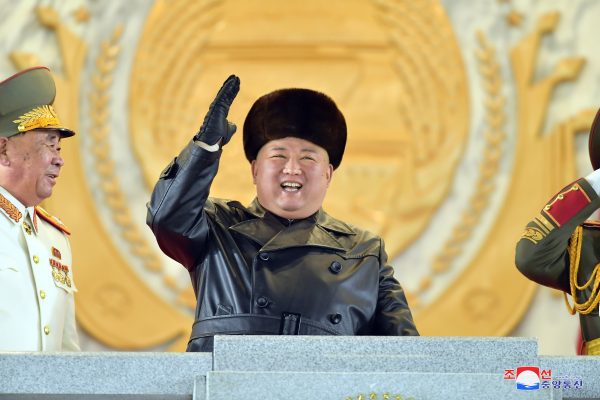Kim Jong-un admitted with unusual frankness that the country had failed to realise the economic objectives it set itself five years ago: to bolster economic growth; diversify economic partners; decrease dependence on China; and improve the lives of the North Korean people. The failures were blamed on natural disasters, the COVID-19 pandemic, the hostile policy of the United States and international sanctions.
Kim has in the past cautiously emphasised the economy as a pillar of his political legitimacy. In 2012 he declared that the North Korean people should never have to tighten their belts again; in 2013 he announced the byungjin line of parallel development of the economy and nuclear weapons; and in 2018 he declared that nuclear development was complete and all efforts should be devoted to economic development.
With the economy now under stress this was no longer tenable. Sanctions have been hurting since 2017 after the United Nations Security Council moved to impose tougher restrictions on the country in response to increased missile testing and North Korea’s fifth and sixth nuclear tests. The border with China, North Korea’s only significant trading partner, has been closed since early 2020 to stop COVID-19 given that the North Korean healthcare system doesn’t have the resources to deal with the virus. As Benjamin Katzeff Silberstein notes, North Korea’s trade, already cut by sanctions pressure, is estimated to have dropped by 80 per cent in 2020 on 2019 levels.
To remedy the situation, Kim has identified increasing state control over the economy, improving economic management, and improving self-sufficiency as top priorities. In practice this likely means a crack-down on private economic activity, which though nominally illegal has been allowed to flourish and play a more important role in the economy as the state sector has struggled. Cracking down may be designed more to help secure funds for the regime over the short term by squeezing businesses for the privilege of staying open, but will likely stifle longer term growth and snuffle reform.
In blaming hostile external forces for the country’s current predicament, a tried-and-true formula from the family playbook, Kim Jong-un labelled the United States North Korea’s ‘biggest enemy’. To protect North Korean security, he pledged to make improvements to the country’s nuclear arsenal including tactical nuclear weapons and multiple warhead capable missiles.
This puts incoming US president Joe Biden on alert in the lead up to his inauguration on 20 January.
South Korea was also targeted for vitriol despite the efforts of the Moon Jae-in administration in prioritising engagement. This included Moon’s recent reach-out to Pyongyang through banning the distribution of propaganda leaflets across the border by South Korean NGOs. Kim Jong-un’s younger sister, Kim Yong-jo, released a statement criticising the South Korean military joint chiefs of staff for comments on intelligence related to a military parade in the North. At the same time, Kim Jong-un has rejected Moon’s offers of cooperation on fighting COVID-19, humanitarian aid and tourism, and used the Congress to blast him for increasing the South’s defence budget and importing US military hardware. Kim demanded South Korea stop conducting joint military exercises with the United States, even though these exercises have been suspended or downsized since Kim’s first meeting with US President Donald Trump in Singapore in 2018. The dilemma for Moon, as his government seeks to continue engagement with the North, is how to realise the transfer of wartime operational control (OPCON) from Washington to Seoul that requires a large-scale drill to demonstrate its preparedness to the United States.
In our lead article this week, Naoko Aoki explains that if the Biden administration is to have any hope of progressing the denuclearisation of North Korea, it will need to ‘seek better coordination with [its] allies South Korea and Japan’, as well as cooperation with China, despite their currently chilly relations. Trump’s unilateral approach, deciding to meet with Kim and announcing the suspension of US–ROK joint military drills without consultations, caused South Korea and Japan considerable angst given its impact on their security. If North Korea believes it’s able to divide and conquer a united approach among the region’s major players to rein in its nuclear program, it will be hard to bring it to the table for credible negotiations.
Given North Korea’s tough economic situation, the failure of negotiations with Trump since the Hanoi summit in February 2019, and Biden’s pledge that he will follow ‘principled diplomacy’ and only meet Kim if he commits to denuclearise, there is an increased chance that North Korea will seek to confect a crisis through missile or nuclear tests or other military provocations. On past performance, it would then try to negotiate a return to the status quo ante in exchange for a relaxation of sanctions or economic aid.
The challenge for the Biden administration is to avoid falling into the traps that befell his predecessors. The Obama administration’s ‘strategic patience’ essentially equated to doing nothing and gave North Korea space to develop its weapons. Trump’s reality-TV summitry got the ball rolling but lacked the groundwork for a meaningful agreement that could progress denuclearisation.
Biden needs to find a balance between not rewarding confected crises and sending North Korea a clear message that progress on denuclearisation will be reciprocated with step-for-step progress on security guarantees and a permanent peace treaty to guarantee its post-denuclearisation survival. If the Biden administration can thread this needle and find a way to engage North Korea in meaningful negotiations, it might just stitch a deal.
The EAF Editorial Board is located in the Crawford School of Public Policy, College of Asia and the Pacific, The Australian National University.

